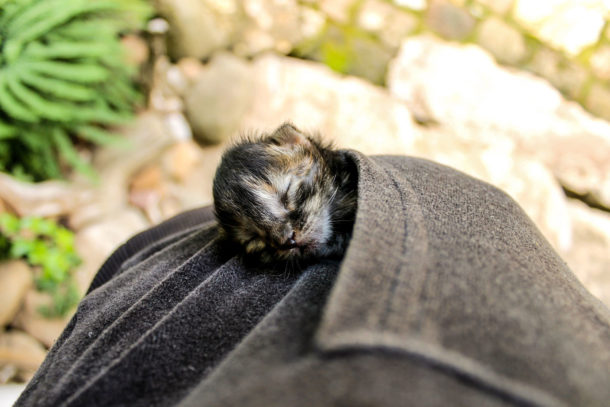What’s the difference between poor sleep and insomnia?

Does this kitten inspire jealousy? You might have insomnia. (Or a thing for kittens.)
For many people, the word insomnia brings to mind images of someone who never sleeps.
In my experience, that’s not very common. Many people do have a night here or there where they don’t get much—if any—sleep. And yes, there are a few “insomniacs” who survive on a shockingly small amount of sleep. But the diagnosis of insomnia doesn’t rest on whether you average two or eight hours a night. Insomnia means that you have trouble falling asleep or staying asleep.
When you go to bed, do you feel dead tired and wide awake? That’s probably insomnia.
Here’s another clue: if you’ve ever been prescribed a pill for sleep, your doctor was probably treating insomnia.
Thankfully, you don’t have to rely on these rules of thumb. The American Academy of Sleep Medicine has created relatively straightforward diagnostic guidelines.* They describe insomnia using four primary criteria:
- You have trouble falling asleep or difficulty returning to sleep after waking up during the night.
- You experience daytime symptoms such as sleepiness, fatigue, irritability, or reduced motivation.
- You have adequate opportunities and circumstances for sleep. (In other words, you can’t sleep well even though you have enough time to sleep, and a safe, generally quiet place to sleep.
- Your sleep sucks 3 or more times each week.
If all of this rings true, you may have insomnia. But it’s not quite that simple. The official diagnostic manual also asks doctors to rule out other sleep disorders like obstructive sleep apnea and restless legs syndrome. And a good doctor will also be thinking about medical problems that might make sleep worse, as well as sleep-disturbing psychiatric disorders like depression and anxiety.** (That’s one reason why it’s important to be diagnosed by a competent medical professional.)
After the diagnosis is established, doctors characterize insomnia into one of three subtypes:
- Short-term insomnia has lasted for less than 3 months
- Chronic insomnia has been present for at least 3 months
- Other insomnia is a catch-all phrase for symptoms that don’t meet full criteria for insomnia, but which still causes significant problems. (Other insomnia is another word for poor sleep that isn’t caused by another sleep disorder. It’s all insomnia!)
I hope that helps! Putting a name to a disorder is often the first step in getting effective treatment. And here’s the good news: most people with chronic insomnia recover when they receive the right treatment!***
Jeff Clark, MD
Slumber Camp Director
Nerdy Footnotes
* These criteria are slightly simplified so that you don’t get lost in a mountain of medicalese. Criterion 1 also includes additional behaviors that suggest a child has insomnia, and the list of official daytime symptoms in Criterion 2 is a bit unwieldy. In short, these criteria are good enough for our purposes, but an in-person appointment with your doctor can provide much more nuance.
** A medical or psychiatric cause for insomnia doesn’t necessarily change the initial treatment for insomnia, but these disorders often need to be managed before sleep completely improves.
*** What’s the right treatment? The American Academy of Sleep Medicine, the American College of Physicians, and the European Sleep Research Society all recommend cognitive behavioral therapy for insomnia (CBT-I) as the first-line treatment for chronic insomnia. (There are no clear guidelines on treatment of short-term and other insomnia, but strong theoretical reasons to believe that CBT-I is still a great solution for these disorders.) Unfortunately, most medical clinics don’t have a CBT-I specialist you can see. I’ve created Slumber Camp to give highly motivated individuals a chance to experience this therapy for themselves at a fraction of the cost of in-person therapy. I hope you’ll give it a try.
Copyright 2017 - , Wonderberry LLC (dba Slumber Camp).
Slumber Camp teaches the principles of cognitive behavioral therapy for insomnia (CBT-I), an evidence-based therapy. It is not intended to replace the diagnosis, advice, and treatment provided by a qualified healthcare professional. Slumber Camp is not for everyone, and you should talk with your doctor to consider your individual situation before making any health-related decisions. Slumber Camp cannot be held responsible for any harm caused by your choice to engage in this course. By using this website, you agree to be bound by the terms of our Legal Agreement.


